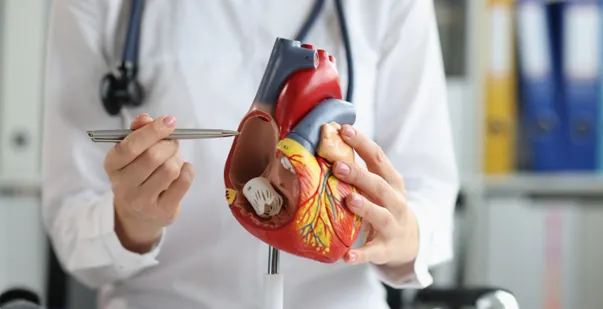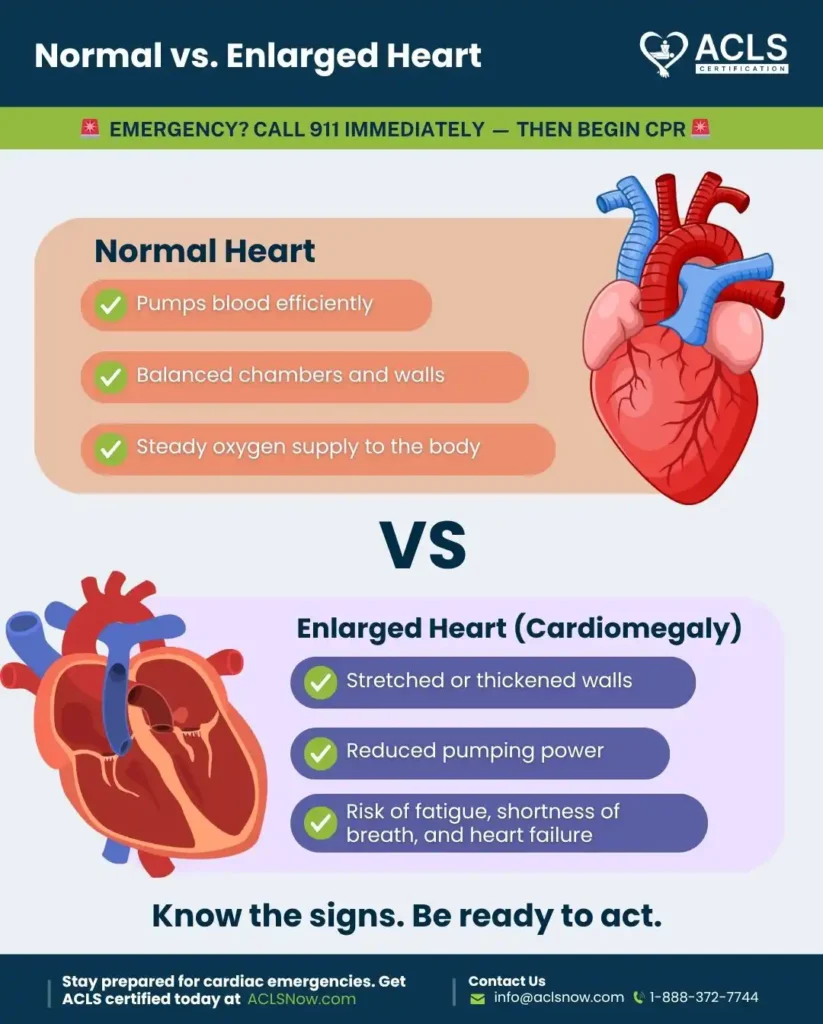The heart is the most vital organ in our body, which pumps blood, supplies oxygen and helps us stay alive. An enlarged heart, also known as cardiomegaly, is a serious condition that can impact how effectively your heart pumps blood. Cardiomegaly isn’t a disease on its own but rather a sign of other heart issues, like heart attacks. In this blog, we’ll explore everything you need to know about cardiomegaly.
Master ACLS Now
Get ACLS certified with confidence
What is Cardiomegaly?
The cardiomegaly definition refers to the physical enlargement of the heart. This enlargement can occur when the heart muscles thicken or when the heart chambers (the spaces inside the heart) become larger. When a person has mild cardiomegaly, the heart is only slightly bigger than normal, and symptoms may not be noticeable right away. However, over time, this can lead to more serious heart problems. There are two main types of cardiomegaly:
Hypertrophic Cardiomegaly
In hypertrophic cardiomegaly, the heart muscles thicken, particularly in the walls between the left and right sides of the heart. As the muscles become thicker, the heart’s internal space for holding blood is reduced, making it harder for the heart to pump blood effectively to the rest of the body.
Dilated Cardiomegaly
Dilated cardiomegaly occurs when the heart chambers, especially the left ventricle (the main pumping chamber), become enlarged and weakened. As the chambers expand, the heart walls become thinner, and the heart muscle loses its strength. Reduced efficiency in pumping This reduction in pumping efficiency can lead to poor blood circulation throughout the body.
Now that we understand what an enlarged heart is, let us look at its causes.
Read More: An Ultimate Guide to Cardiac Conduction System
Causes of an Enlarged Heart
Approximately 1 in 500 adults in the United States is diagnosed with cardiomegaly. Cardiomegaly is most similar to cardiac conditions, where the heart struggles to pump blood efficiently. There are several reasons why the heart may become enlarged. Some of the most common causes include:
High Blood Pressure (Hypertension)
Due to high blood pressure pumping blood makes the heart work harder. Over time, this extra effort can cause the heart muscles to thicken and the heart to enlarge. Hypertension is one of the leading causes of cardiomegaly.
Heart Valve Disease
To regulate the flow of blood, there are four valves present in the heart. If one or more of these valves doesn’t work properly, it can cause the heart to become enlarged. Valve problems can be caused by infections, aging, or birth defects.
Coronary Artery Disease
When arteries that supply blood become blocked, then it causes coronary artery disease. The heart has to work harder to pump blood through these restricted vessels, which can lead to enlargement over time.
Heart Attack
A heart attack damages the heart muscle, making it weaker. In response, the heart may enlarge to compensate for this damage and continue pumping blood.
Congenital Heart Disease
Some people are born with heart defects that can cause the heart to become enlarged over time. These defects can affect how the heart pumps blood and may lead to cardiomegaly.
Cardiomyopathy
A disease that directly affects the heart muscle is called cardiomyopathy. Depending on the type, it can make the heart muscle thick, stiff, or weak, leading to an enlarged heart.
Pulmonary Hypertension
A high blood pressure in the blood vessels that supply the lungs is called pulmonary hypertension. This condition can strain the right side of the heart, leading to enlargement.
Chronic Kidney Disease
Kidneys help regulate fluid levels in the body. When they don’t function properly, excess fluid can build up, increasing the heart’s workload. Over time, this can cause the heart to become enlarged.
Anemia
Severe anemia, a condition where the blood lacks enough healthy red blood cells, can cause the heart to work harder to deliver oxygen throughout the body. An enlargedEnlarged heart can develop due to the increased workload.
Diagnosing an Enlarged Heart
In the early stages, not everyone with an enlarged heart will experience symptoms. The enlarged heart symptoms in adults include shortness of breath, chest pain, and fatigue. If you or your doctor suspect that you have an enlarged heart, several tests can help diagnose it:
Chest X-ray
A chest X-ray is the first test doctors use to check if the heart is enlarged. If the heart is larger than normal, it will appear bigger on the X-ray. While this test can show that the heart is enlarged, it doesn’t explain the reason. Doctors often use other tests to find out what is causing the problem.
Electrocardiogram (ECG)
The electrical activity of the heart is recorded by an electrocardiogram (ECG or EKG). Each heartbeat produces electrical signals, and an ECG captures these signals. The graph can show if the heart is beating too fast, too slow, or irregularly. An ECG can help doctors detect heart rhythm problems (arrhythmias) and signs of heart muscle damage, which could be related to an enlarged heart.
Echocardiogram
An ultrasound of the heart is called an echocardiogram. It is very useful for diagnosing an enlarged heart because it provides a detailed view of the heart’s structure and function. Doctors can see if the heart chambers are enlarged or if the heart walls are thickened.
Blood Tests
Blood tests can help doctors identify other conditions contributing to an enlarged heart. For example, a blood test can check for thyroid problems (either overactive or underactive) that may affect heart size. It can also measure anemia, which occurs when the blood doesn’t carry enough oxygen.
Now that we know what causes an enlarged heart and how to diagnose it, let us find out more about see the treatment for it.
Read More: ECG tutorial: Basic principles of ECG analysis
Treatment for an Enlarged Heart
The treatment for an enlarged heart focuses on improving heart function and reducing symptoms. The type of treatment depends on the severity of the condition and what’s causing it. Here are some common treatment options:
Blood Pressure Medications
If high blood pressure is causing an enlarged heart, doctors may prescribe medications like ACE inhibitors or beta-blockers. It makes it easier for the heart to pump blood as it relaxes blood vessels. If you lower blood pressure, it will reduce the strain on the heart, preventing further enlargement and helping the heart function better.
Diuretics
Diuretics, often called “water pills,” help the body get rid of excess fluid by increasing urination. When the body holds on to too much fluid, it can make the heart work harder. Diuretics reduce this extra fluid, lowering the workload on the heart and preventing swelling in areas like the legs and ankles.
Anti-arrhythmic Drugs
If an enlarged heart is causing an irregular heartbeat (arrhythmia), anti-arrhythmic drugs can help. These medications work by stabilizing the electrical signals in the heart, helping it maintain a steady rhythm. This can reduce symptoms like palpitations or dizziness.
Blood Thinners
People with an enlarged heart may be at risk of developing blood clots. Blood thinners, or anticoagulants, help prevent clots from forming, reducing the risk of serious problems like strokes. These medications lower the risk of dangerous complications.
Heart Valve Repair or Replacement
If the enlarged heart is due to a faulty heart valve, surgery may be needed to repair or replace the valve. Heart valves control blood flow through the heart, and when they don’t work properly, the heart can become enlarged. A valve repair or replacement ensures proper blood flow, relieving strain on the heart.
Coronary Bypass Surgery
If blocked arteries are contributing to the enlarged heart, coronary bypass surgery may be necessary. In this procedure, a surgeon takes a healthy blood vessel from another part of the body and uses it to bypass the blocked artery. This improves blood flow to the heart and reduces the risk of further heart damage.
Implantable Devices
In more severe cases of an enlarged heart, your cardiomegaly specialist may recommend an implantable device, such as a pacemaker or defibrillator. A pacemaker helps regulate slow heartbeats, while a defibrillator can correct dangerously fast or irregular rhythms. These devices monitor the heart’s electrical activity and deliver small electrical shocks when needed to keep the heart beating properly.
Key Takeaways for Better Heart Health
An enlarged heart is not a disease on its own but a sign of an underlying problem. If you understand the causes, symptoms, and treatment options, then the condition can be managed to prevent further complications. If you or someone you know has been diagnosed with an enlarged heart, working closely with a cardiomegaly specialist can help maintain heart health and improve quality of life. If you or someone you know is managing an enlarged heart, be proactive about heart health. Consider taking a Basic Life Support (BLS) course to equip yourself with life saving skills.
FAQs
Is an enlarged heart inherently harmful?
Not all the time. Some individuals don’t have any significant issues despite having a slightly enlarged heart. It might, however, indicate a different medical problem, such as high blood pressure or a valve trouble.
Can the size of cardiomegaly return to normal?
Yes, this is possible with timely treatment of the underlying cause. Such as high BP, anemia or a malfunctioning heart valve, which may help regain heart’s normal size. In other cases, the enlargement could not be reversed but treatable.
What symptoms should I look out for?
Many people don’t notice symptoms early on. As the condition progresses, shortness of breath, chest pain, dizziness, or swelling in your legs and ankles may be there. If you experience sudden chest pain or severe shortness of breath, seek help immediately.
Can lifestyle changes really help with an enlarged heart?
Yes, lifestyle habits make a big difference. Simply, eat healthy diet, exercise, quit smoking, and limit alcohol and salt. This helps to reduce strain on your heart and improve overall well-being.
How is an enlarged heart different from heart failure?
They are related but not the same. An enlarged heart describes the size of the heart. While, heart failure is the heart’s inability to pump blood effectively. Cardiomegaly can lead to heart failure if it’s not treated in time.
Glossary
Cardiomegaly (Enlarged Heart)– The size of the heart is bigger than normal.
Hypertrophic Cardiomegaly– When the heart walls get too thick, leaving less room inside the heart to hold blood.
Dilated Cardiomegaly– When the heart chambers stretch out and become weak, making it harder to pump blood.
Ventricle– The two lower chambers of the heart that pump blood out to the body and lungs.
Coronary Arteries– The blood vessels that carry oxygen-rich blood to the heart muscle itself.
Valve Disease– Problems with the “doors” of the heart (valves) that open and close to control blood flow.
Arrhythmia– An irregular heartbeat, which may feel too fast, too slow, or uneven.
Pulmonary Hypertension– High blood pressure (BP) in the vessels that carry blood from the heart to the lungs.
Echocardiogram (Echo)– An ultrasound test that shows pictures of the heart’s size, structure, and pumping action.
Electrocardiogram (ECG/EKG)– A test that records the heart’s electrical signals to check rhythm and detect damage.
Diuretics (Water pills)– Medicines that help the body get rid of extra fluid, making you urinate more.
Blood Thinners (Anticoagulants)– Medicines that prevent clots from forming and lowers the risk of stroke or heart attack.
Pacemaker/Defibrillator– Small devices implanted in the chest to control abnormal heartbeats and keep the heart rhythm steady.
References:
- https://my.clevelandclinic.org/health/diseases/21490-enlarged-heart-cardiomegaly
- https://www.mayoclinic.org/diseases-conditions/enlarged-heart/symptoms-causes/syc-20355436
- https://www.healthline.com/health/enlarged-heart








